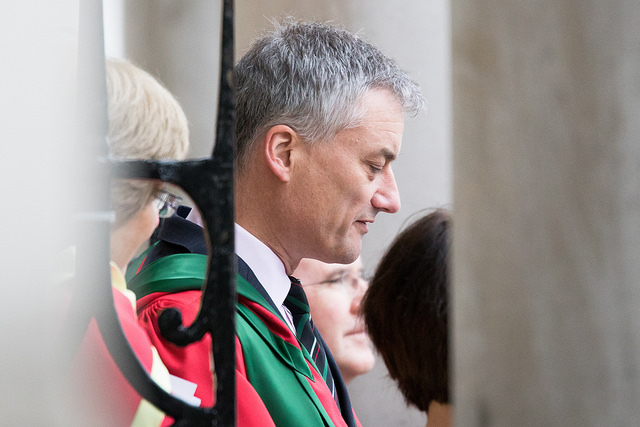With only eight out of 46 members women, the Provost’s Council has faced criticism for its lack of gender balance.
Members of the Provost’s Council include prominent alumni and business people and act as an intimate network to various sectors for Provost Patrick Prendergast. However, female members of the council – which is invite-only – only number 17 per cent.
In an email statement to The University Times, the President of Trinity Women Graduates, Prof Deirdre Ahern, stated: “I would encourage the inclusion of additional women as a positive step to add to the diversity, richness of experience and ultimately the success of the Provost’s Council.”
Speaking to The University Times, Trinity College Dublin Students’ Union (TCDSU) Education Officer Alice MacPherson commented on the selection process for the council: “In any situation where someone is choosing members of a committee personally, it should be gender balance insofar as possible and there should be a diversity of voices at that table. Anything else is not quite acceptable.”
In an email statement to The University Times, the College Press Officer, Caoimhe Ní Lochlainn, stated that “gender Equality is fundamental to Trinity’s core values” and spoke about the efforts the College has made towards gender equality, referencing the Athena Swan awards and the gender balance on the College Board and on University Council.
Ní Lochlainn explained that the council was “made up of alumni primarily” and spoke about how they were selected: “In addition to ensuring broad geographical coverage among the membership, individuals have been selected of high achievement in their chosen fields, who have expressed a willingness to support the College in this present Campaign. They range in age, experience and geographic location. They also act as ambassadors within their spheres of influence.”
“The membership of the Provost’s Council is a rolling one and is continuously reviewed”, she added.
Speaking to The University Times, Caroline Haughey, one of the members of the council and a Trinity law graduate, said that she “hadn’t actually noticed” that only 17 per cent of the council was made up of women.
“I certainly would not want to be invited onto the committee because I was a girl. I want to be appointed, as I think anyone would, because we were the right person to be there, regardless of whether we were male, female or genderfluid”, she said.
According to Haughey, the process for her selection with Prendergast was very informal: “We went for a cup of tea in a cafe in Victoria early one morning and he told me what was happening at Trinity and then asked me if I had any ideas from where I was and how I would improve Trinity.”
Prendergast invited her to join his council in February 2017.
Trinity Women Graduates, which is the oldest alumni association in the College, recently saw Prendergast speak at the 95th anniversary of the organisation. Speaking at the event, Prendergast said: “For me, as for every 20th and 21st century graduate, this campus is unimaginable without women. To think of it as an all-male bastion as it was for over 300 years, actually induces a chill. How did anybody think that was a good idea?”
Reflecting on the current progress made with gender equality, he said that “while we have come very far in a century, so much still remains to be done to achieve true equality, both nationally and globally”.
In April, Trinity said it would likely not be appointing a vice-president for gender equality, despite recommendations from the Higher Education Authority (HEA) for all universities to do so.
The Provost’s Council was set up last year and acts as a group of advisors to the College. Notable members include former Provost John Hegarty, Chairman of Trinity Business School and a former candidate for the Trinity panel on the Seanad Seán Melly and Trinity Pro-Chancellor Prof David McConnell. The council has played a vital role in the planning of Trinity’s first fully fledged philanthropic campaign, which is set to be launched next year.
Gender inequality has plagued universities and colleges around Ireland for years, with a small number of women reaching top academic positions. There has never been a women president or provost in an Irish university.
In July of this year, progress in gender equality was said to be moving at a “snail’s pace”, with only marginal improvements of one to two per cent in the representation of women in governing roles and professorship positions in higher education institutions.
A Trinity report published last year revealed that, at the current rate of progress, full gender equality would not be achieved in the university until 2098. It also showed that women are underrepresented in senior academic positions, with two out of three faculty deans, 63 per cent of heads of schools and 73 per cent of Fellows male in 2015.
In Irish universities, a lot of progress is yet to be made in governance and management structures, with four out of seven universities achieving a minimum of 40 per cent women on governing boards or committees. Only two universities have 40 per cent representation of women on their academic councils and none of the universities have achieved this minimum in their executive management.
Gender inequality in higher education has long been seen as one of the biggest challenges facing the sector. A HEA report, published last year in the wake of the controversial court case involving an NUI Galway lecturer and the college, made a number of sweeping recommendations in a bid to ensure greater equality across the sector.







